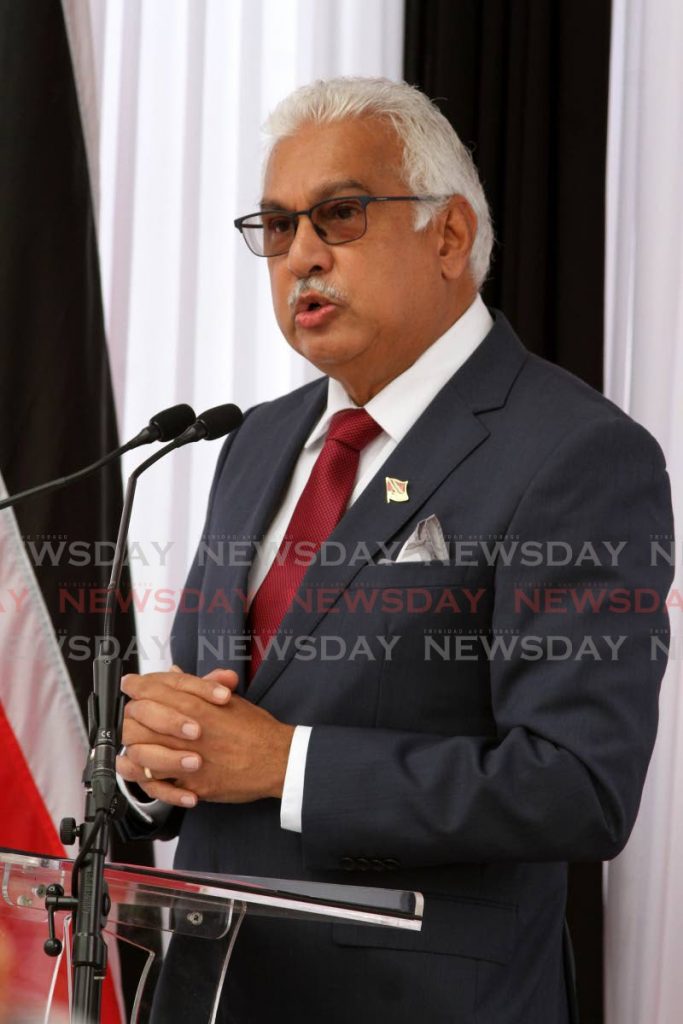Deyalsingh: Covid19 vaccine won't be mandatory

IT WILL NOT BE MANDATORY for people to take the vaccine against covid19.
So said Minister of Health Terrence Deyalsingh at his ministry’s virtual press conference on Monday.
Deyalsingh said TT citizens cannot be forced to take the vaccine, for two reasons: firstly, each citizen has a right to privacy enshrined in the constitution, and secondly, there are some people who may react badly to the vaccine.
“There are some members of the population (who) because of inherent medical conditions, cannot be vaccinated," he explained. "Some children just cannot take the vaccine. Then there are people who are allergic to the vaccine.
"So you can’t force a vaccine upon someone for medical reasons.
"But it will be strongly recommended for people who are in the frontline and those who are physically able to take the vaccine.”
Deyalsingh added that, for the time being, this also extends to people being repatriated into the country.
He said while there is a precedent that people are not allowed to enter a country without certain vaccinations, no such policies have been developed for covid19.
“That may apply to covid19 in the future, but we don’t know as yet. That is an evolving issue and we will look at it.”
50,000 doses in phase 1
The vaccination process, Deyalsingh said, will begin in March, with 50,000 doses of vaccine. Deyalsingh said the vaccines are being procured through two avenues – Covax, a global mechanism for the pooled procurement and equitable distribution of covid19 vaccines, and through individual talks with companies like Pfizer from the US, AstraZeneca from the UK and Sinopharm out of China.
Deyalsingh said in the first phase, public health officials will be offering the vaccine to 25,000 people, who would have to take the vaccine in two doses. After the first dose is shared among them, with a focus on the elderly, frontline workers and healthcare workers, the vaccination programme will be stopped, and the ministry would reserve the rest for their second dose.
The first dose is a primer, which could give an estimated 52 per cent protection against the virus. Depending on the brand, people would need to wait anywhere between three weeks to a month to be able to take the second dose, providing them with up to 92 per cent protection against the virus.
“The expiry date so far seems to indicate a six-month shelf life,” said Deyalsingh. “When you have to reserve vaccines for three weeks to four weeks it means that you have lost a month. So in effect you really have five months to vaccinate people.”
Deyalsingh said the Chief Medical Officer, along with other CMOs from across the region, will be meeting with the World Health Organisation (WHO) and the Pan American Health Organisation (PAHO) to talk about procuring vaccines through the facility for the region.
“This will address which vaccines have been assessed, which have been approved, which are better candidates for our population.”
This is not the first time at the rodeo for vaccinations, according to health officials. Both Deyalsingh and CMO DrRoshan Parasram said Caricom and Pan-American regions, and by extension TT, have one of “the most robust vaccination programmes in the world,” adding that the region has been embarking on mass vaccination programmes for decades.
“We are accustomed to doing this mass vaccination programme and delivering multi-dose vaccination regimes,” Deyalsingh said. “I just want to give the population the assurance that we are not doing this for the first time. What we are doing is taking an already robust mass vaccination system and tailoring it to covid19 vaccines."
Medical professionals: Vaccines are safe and effective
Professor of molecular genetics and virology at UWI, St Augustine Christine Carrington addressed concerns over vaccines and the possible side effects, assuring that the vaccines are safe, were stringently tested, and will still be monitored for their effects.
Carrington said vaccines are made from “harmless” viruses which resemble those of the virus in question, so the body could develop immunity against it should the actual virus invade the body. She added that medics were working on a means to produce vaccines rapidly before the spread of covid19.
Responding to concerns over information on social media about "medical events" which were documented during clinical trials of the vaccines, Carrington said that was par for the course in testing the vaccine.
“When you have tens of thousands of people enrolled in a study, it is likely that a few will develop some sort of medical problem. You have to distinguish between what would have happened if someone was not vaccinated and what is due to the vaccine. So in order to identify even the most unexpected signals of possible vaccine caused harm during these trials, every single adverse effect is documented and reported. It doesn’t matter if there is a heart attack, or if he stubbed his toe or if they were in a car accident.”
She added that the information listing health events during trials included true reactions to the vaccine, as well as totally unrelated health problems.
Some of the "official" effects associated with the vaccine include pain, swelling and redness around the spot where the individual was injected, fever, chills, headache and muscle pain.


Comments
"Deyalsingh: Covid19 vaccine won’t be mandatory"